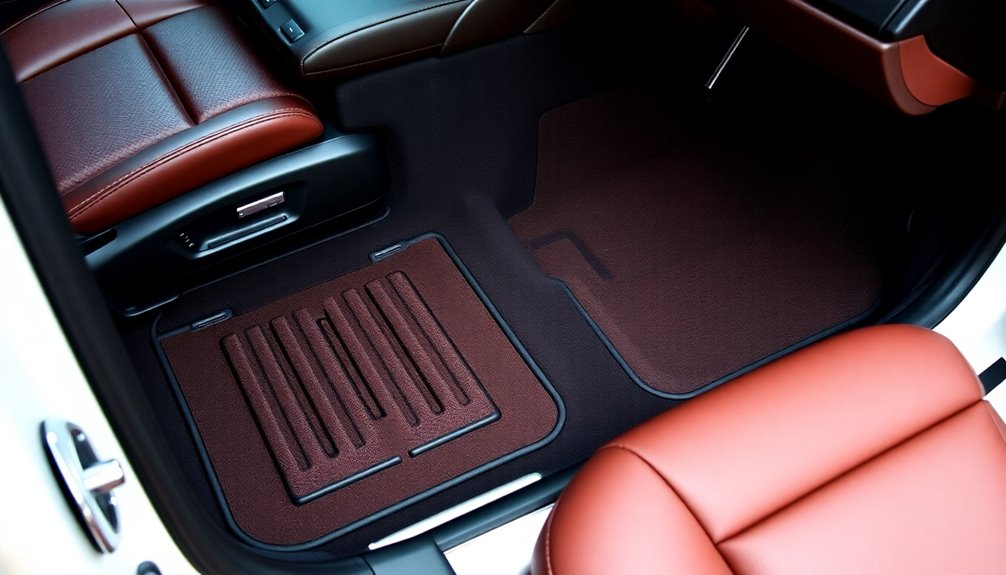To become a haute couture designer, you need to master essential skills like sewing and pattern-making. Gain practical experience through internships in fashion capitals, where you can learn the ropes and build connections. It's vital to understand haute couture standards, such as craftsmanship and client expectations. Develop strong client relationships by personalizing their experience and maintaining consistent communication. Finally, hone your business acumen to navigate pricing and market trends effectively. Each step you take isn't just about design; it's about creating unforgettable experiences. Stick around, and you'll uncover even more valuable insights for your journey.
Key Takeaways
- Acquire a solid foundation in sewing, pattern-making, and textiles through structured education and hands-on experience with industry-standard tools.
- Gain practical experience through internships and participation in fashion shows to understand haute couture craftsmanship and industry intricacies.
- Familiarize yourself with haute couture standards, including rigorous craftsmanship and client expectations, to create relevant and original designs.
- Build strong client relationships by personalizing experiences and maintaining consistent communication to foster loyalty and engagement.
- Develop business acumen by understanding pricing strategies, market trends, and financial management to sustain a successful design career.
Education and Skill Development
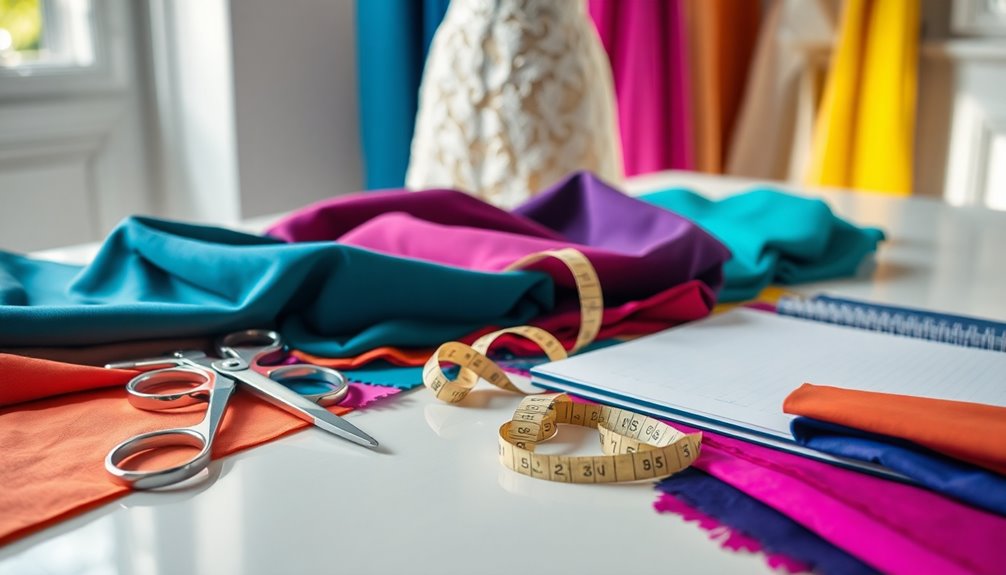
To become a successful haute couture designer, it's crucial to invest in your education and skill development.
You'll need a structured environment to hone your sewing, pattern-making, and textiles skills. Hands-on experience with industry-standard tools will prepare you for the fast-paced fashion world.
Enrolling in courses focused on digital design and CAD will provide you with the technological skills fundamental for modern design. Learning from faculty with industry experience offers mentorship and valuable insights.
Mastering garment construction is critical for precision, while proficiency in pattern making guarantees you can create custom patterns for client measurements.
You'll also need in-depth fabric knowledge to select materials that align with your design vision, enhancing your ability to bring concepts to life.
Gaining Practical Experience
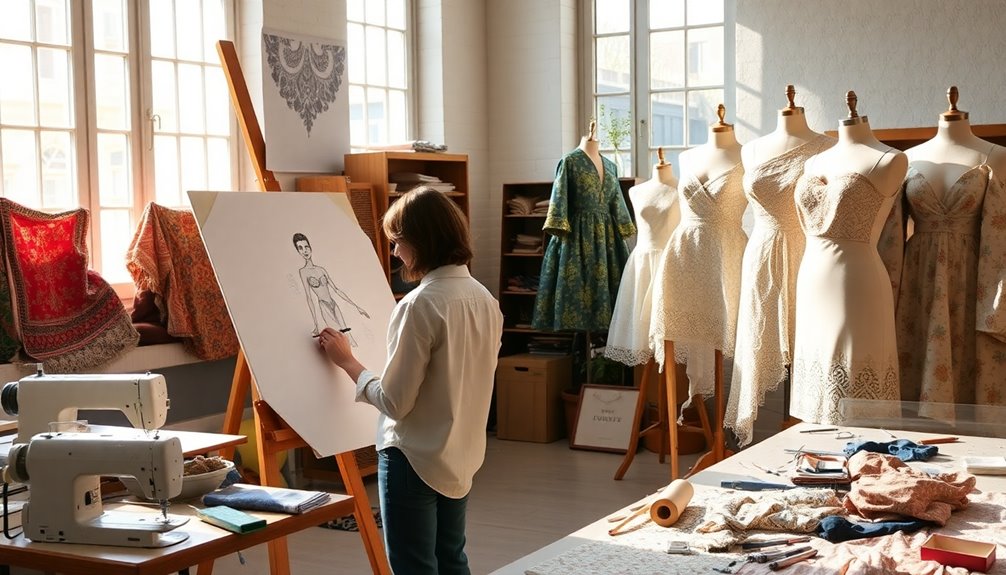
Gaining practical experience is essential for aspiring haute couture designers, as it immerses you in the industry's intricacies. Engaging in real-world scenarios helps you develop a keen understanding of the fashion world.
Consider these impactful avenues to boost your experience:
- Internships: Work alongside seasoned designers in fashion hubs like Paris, learning the nuances of haute couture firsthand.
- Fashion Shows: Participate as a dresser or assistant, gaining insight into the preparation and execution of high-profile events.
- Atelier Work: Collaborate in an atelier environment, where you can refine your skills on made-to-order garments and learn the importance of craftsmanship.
These experiences not only enhance your skill set but also build invaluable connections that can propel your career forward.
Understanding Haute Couture Standards
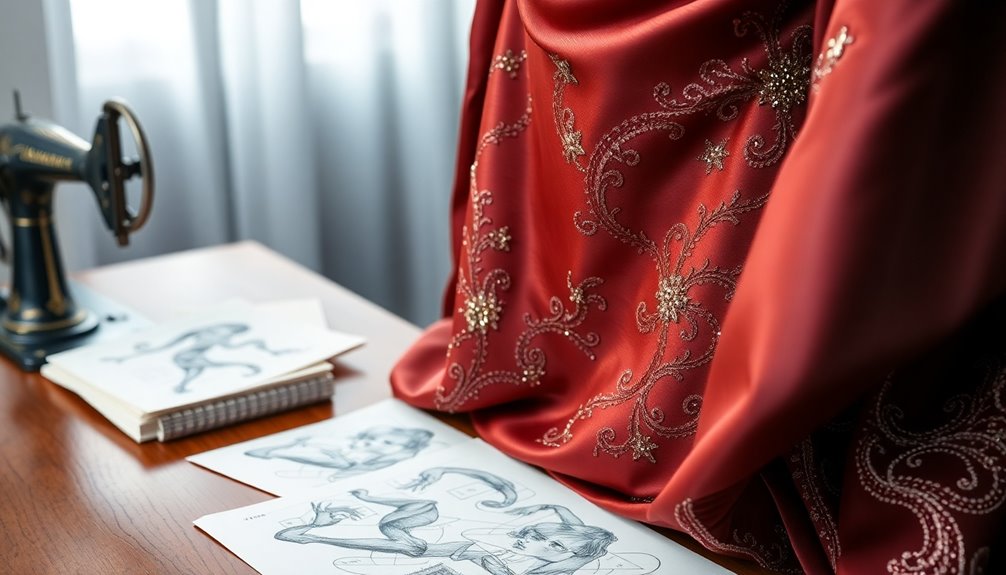
Understanding haute couture standards is essential for anyone aspiring to make a mark in this exclusive segment of fashion.
To be recognized as a haute couture house, you need an atelier in Paris and at least 15 full-time employees. You'll have to adhere to strict craftsmanship standards that set haute couture apart from ready-to-wear. Knowing client expectations and seasonal trends is crucial, as is using high-quality, unique fabrics.
Each collection must feature at least 50 original designs, with each garment requiring over 150 hours of meticulous work. Remember, the term "haute couture" is legally protected in France, so compliance with industry regulations is critical for your credibility and reputation.
Embrace these standards, and you'll build a successful foundation for your haute couture journey.
Client Relationship Management
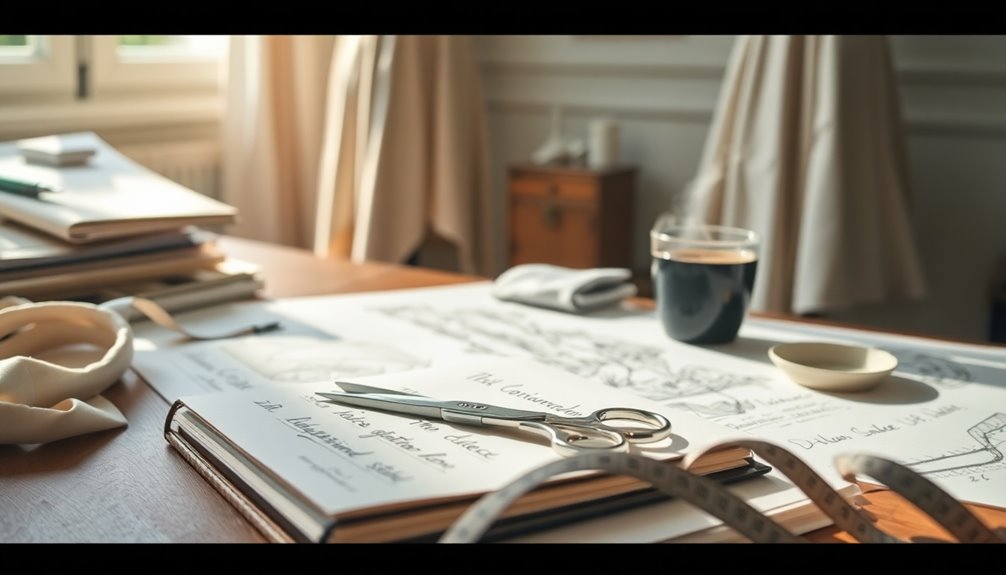
Building strong client relationships is essential for success in haute couture, where exclusivity and personalized service reign supreme.
You need to create an unforgettable experience for your clients, ensuring they feel valued and unique. Here are three ways to deepen those connections:
- Personal Touch: Know your clients' preferences and style choices, making each interaction tailored and special.
- Exclusive Access: Offer loyal clients sneak peeks of new collections, making them feel part of your creative journey.
- Consistent Communication: Keep clients informed with updates on new designs and trends, reinforcing their importance to your brand.
Business Acumen for Designers
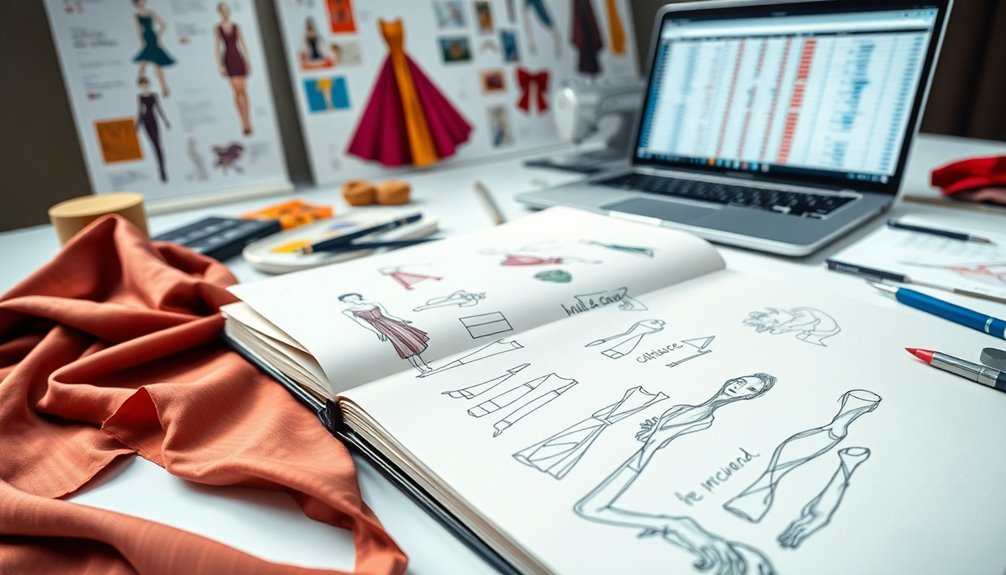
While creativity is essential in haute couture, having solid business acumen can make the difference between a fleeting career and lasting success. Understanding pricing strategies, market trends, and client preferences is vital. You should develop strong client relationships and guarantee satisfaction for repeat business.
| Key Areas | Strategies | Importance |
|---|---|---|
| Pricing | Research competitive rates | Maximizes profitability |
| Client Engagement | Personalize experiences | Builds loyalty and exclusivity |
| Market Awareness | Monitor industry trends | Adapts collections effectively |
Networking Strategies

In the competitive world of haute couture, networking serves as an essential tool for your career advancement.
Building relationships with industry insiders can open doors to valuable opportunities.
Here's how to enhance your networking strategies:
- Attend Fashion Events: Engage with peers and industry leaders at fashion weeks and trade shows. Your presence can lead to unexpected collaborations.
- Utilize Social Media: Share your designs and connect with influencers and fellow designers. A strong online presence can amplify your reach.
- Seek Mentorship: Find established professionals willing to guide you. Their insights can be invaluable and may lead to career-defining connections.
Portfolio Creation Tips
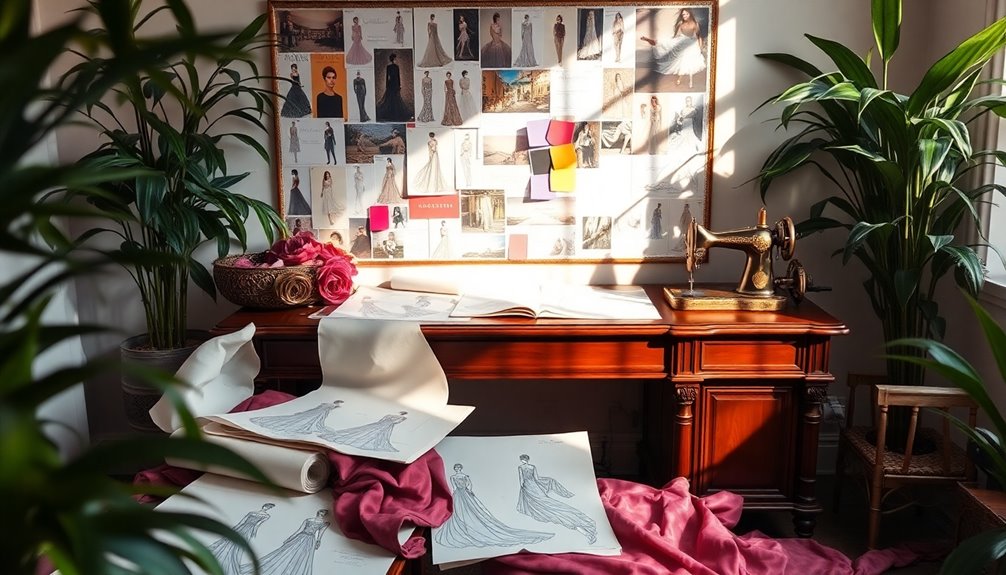
A strong portfolio is your calling card in the haute couture world, showcasing your unique vision and craftsmanship.
Start by gathering 15-20 diverse pieces that highlight your skills and style. Focus on quality over quantity; each piece should reflect your best work.
Organize your designs logically to create a cohesive narrative that captures your creative journey. Include high-quality photographs and technical drawings to demonstrate your attention to detail.
Don't forget to showcase your fabric choices and any problem-solving techniques you've employed. Keep your portfolio updated as you grow and evolve.
Finally, attend fashion weeks and trade shows to network and gain insights that can further enhance your collection, making connections that could lead to exciting opportunities.
Staying Updated With Trends
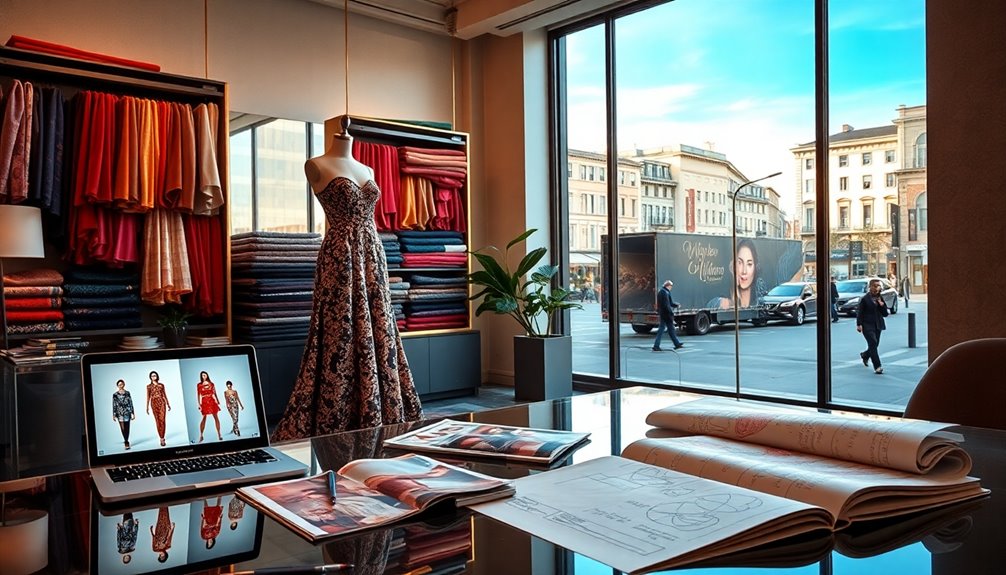
To stay ahead in the ever-evolving world of haute couture, you need to actively follow the latest trends and innovations.
Keeping your finger on the pulse of fashion isn't just beneficial; it's essential. Here are some ways to stay informed:
- Fashion Shows: Attend major events like Paris Fashion Week to see new collections and gain inspiration directly from the runway.
- Fashion Publications: Subscribe to top magazines and blogs that cover emerging trends and industry insights.
- Social Media: Follow influential designers and brands on platforms like Instagram to get real-time updates and engage with the fashion community.
Additionally, consider examining how current trends in tropical contemporary architecture influence the use of sustainable materials in fashion design.
Frequently Asked Questions
What Are the Typical Salaries for Haute Couture Designers?
Typical salaries for haute couture designers can vary widely based on experience, reputation, and location.
You might start around $50,000 to $70,000 annually, but as you gain recognition, this can escalate to six figures or more.
Top designers at prestigious houses can earn upwards of $200,000 or even considerably higher.
Factors like clientele exclusivity and successful collections also influence your earning potential in this competitive field.
How Long Does It Take to Become a Haute Couture Designer?
It typically takes several years to become a haute couture designer.
You'll need a solid foundation in fashion design, which usually involves a degree and hands-on experience.
Apprenticeships and internships in renowned fashion houses can greatly shorten the timeline.
Expect to spend time honing your skills in pattern-making, textiles, and client relations.
Building a strong portfolio and networking within the industry will also accelerate your journey towards becoming a respected designer.
Are There Specific Fashion Schools Known for Haute Couture Training?
Yes, several fashion schools are renowned for haute couture training.
You should consider institutions like the École de la Chambre Syndicale de la Couture Parisienne in Paris, which specializes in haute couture techniques.
The Fashion Institute of Technology and Central Saint Martins also offer programs that emphasize craftsmanship and design.
Attending these schools can provide you with the skills and networking opportunities necessary to thrive in the haute couture world.
What Are Common Challenges Faced by Haute Couture Designers?
Steering through the world of haute couture can feel like dancing on a tightrope, balancing creativity and business acumen.
You'll face challenges like managing demanding clients who expect perfection, sourcing rare fabrics, and keeping up with ever-evolving trends.
The pressure to deliver unique, handcrafted pieces within tight deadlines can be overwhelming.
Plus, building a reputation in a competitive industry requires relentless networking and continuous learning to stay relevant.
Embrace these hurdles; they'll shape your artistry.
How Important Is Sustainability in Haute Couture Design Today?
Sustainability's incredibly important in haute couture today.
You need to create exquisite pieces that not only showcase craftsmanship but also respect the environment. By choosing eco-friendly fabrics and sustainable production methods, you can appeal to discerning clients who value ethical fashion.
Plus, incorporating sustainability into your designs can set you apart in a competitive market. Embracing this shift not only benefits the planet but also enhances your brand's reputation and longevity.
Conclusion
As you step into the enchanting world of haute couture, remember that every stitch tells a story and every fabric holds potential. Embrace the journey of mastering your craft, nurturing client relationships, and weaving your unique vision into each creation. With passion and perseverance, you'll not only adorn the elite but also elevate the very essence of fashion. So, take a deep breath and let your creativity flourish—your moment in the spotlight is just around the corner!

